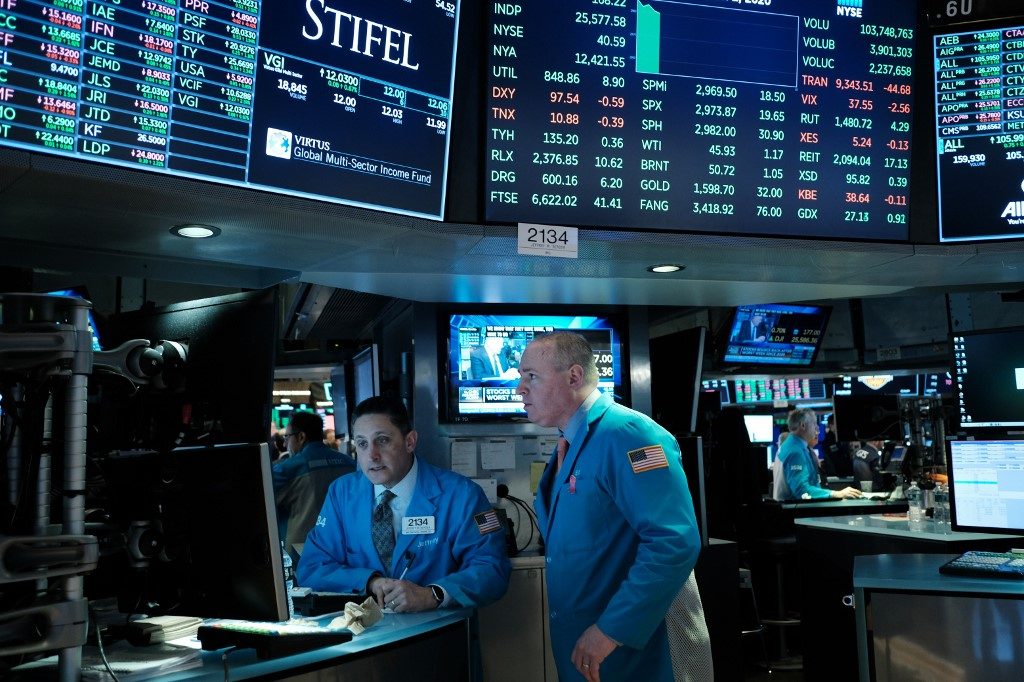SUMMARY
This is AI generated summarization, which may have errors. For context, always refer to the full article.

NEW YORK, USA (UPDATED) – Global stock markets experienced exceptional volatility on Monday, March 2, but Wall Street bounced back after the G7 announced a strategy session for Tuesday, March 3, to coordinate response to the coronavirus epidemic.
Equities were hammered worldwide last week, suffering the worst losses since the 2008 global financial crisis, as investors weighed the likely cost of the novel coronavirus crisis for world business.
But amid signs governments were bringing out the big guns, the benchmark Dow jumped 5.1% or nearly 1,300 points, recovering some of the 12% lost last week. The recovery in the broad-based S&P 500 was just shy of that, a gain of 4.6%.
European markets suffered wild price swings, but strength on Wall Street helped them emerge from the red after governments and central banks said they would step in if needed to soften the blow to the economy.
The strong finish came after the United States Treasury announced that Secretary Steven Mnuchin and Federal Reserve Chairman Jerome Powell will lead a conference call with their G7 counterparts on how to respond to the virus.
“It’s been an extremely oversold market and there’s expectations for all kinds of fiscal and monetary easing,” said Karl Haeling of LBBW.
But analysts urged caution amid uncertainty about what lies ahead. A US survey of manufacturers released Monday showed weaker than expected activity due to coronavirus, but warned more impact is expected.
Globally, the death toll has topped 3,000 and includes 6 fatalities in the US, all in Washington state.
Frankfurt posted moderate losses by the closing bell, while Paris eked out a small gain.
London added more than 1%, helped by a weakening pound against the euro as the European Union and Britain kicked off Brexit trade deal talks.
Can central banks help?
After markets closed, the European Central Bank (ECB) issued a statement pledging to take action as needed to address the crisis, following the example of the US Federal Reserve that released a similar statement Friday, February 28.
“We stand ready to take appropriate and targeted measures, as necessary and commensurate with the underlying risks,” ECB chief Christine Lagarde said in a statement.
Earlier, the Bank of England said that it was “working closely” with “international partners to ensure all necessary steps are taken to protect financial and monetary stability.”
Some analysts warned, however, that investors should not place too much hope in central banks, since the Fed’s policy rate is very low and the ECB’s key rate is already negative, severely reducing any scope for further action.
Markets view as a certainty a Fed rate cut at its March 17-18 policy meeting. (READ: Fed vs coronavirus: What can the U.S. central bank do?)
‘High risk’
Analysts warned of further turmoil on trading floors as governments struggle to contain the disease. (READ: PSEi falls to 6,700)
“Markets face significant uncertainty in the short term and remain at high risk of more downside given the unknowns around COVID-19,” said Shane Oliver, a global investment strategist at AMP Capital Investors.
In Asian trading, Shanghai led gainers, rising 3.2% after dropping more than 5% last week, while Hong Kong closed up 0.6% after a loss of around 4%.
Tokyo rose 1%.
The gains came on hopes for government stimulus after an index of Chinese manufacturing activity fell to its lowest level on record in February as factories around the country were shuttered. – Rappler.com
Add a comment
How does this make you feel?
There are no comments yet. Add your comment to start the conversation.